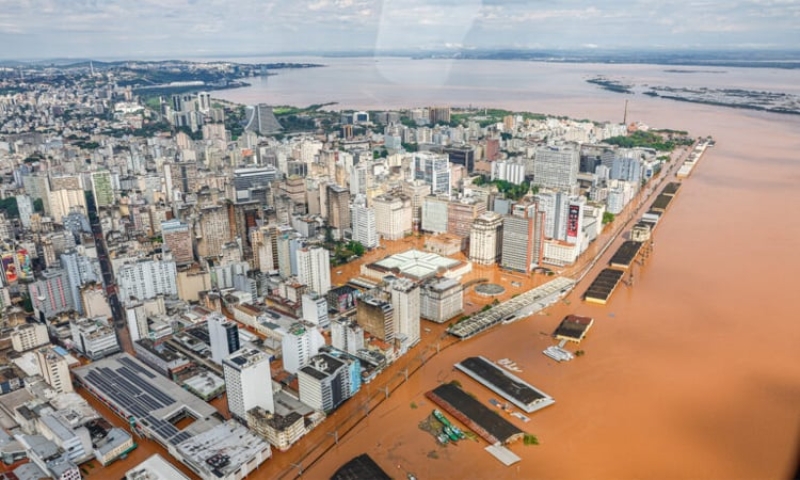- Bangladesh 2024, Nepal 2025: Youth Movements Force Leaders Out |
- Nepal PM resigns as 19 killed in social media ban, graft protests |
- Western Support for Israel Faces Growing Strains |
- Nepal lifts social media ban after 19 killed in protests |
- DU VC vows maximum transparency in Tuesday's DUCSU elections |
Rains Fuel Disasters in 83pc of Brazilian Cities: Report

Widespread flooding submerges parts of Porto Alegre, Brazil, as rising water levels inundate streets and buildings—highlighting the growing impact of extreme weather events linked to climate change.
Extreme weather events driven by global warming have caused natural disasters in 83 percent of Brazil’s cities between 2020 and 2023—three times more than recorded in the 1990s, according to a new study published on Tuesday.
The report, released by the Brazilian Alliance for Oceanic Culture in collaboration with public and private institutions, warns that climate-induced rainfall is becoming increasingly frequent and destructive across Latin America’s largest country.
The study reveals a sharp rise in floods, river surges, and landslides, with the number of such events increasing from 2,335 in 2020 to 7,539 in 2023. These disasters, concentrated in both urban and rural areas, have left a deep imprint on the country’s infrastructure, economy, and human lives.
Scientists explain that rising global temperatures increase the amount of water vapour in the atmosphere—approximately 7 percent more per additional degree Celsius—which in turn escalates the risk of intense and prolonged rainfall. In Brazil, this phenomenon has translated into severe weather conditions, overwhelming drainage systems, and causing massive damage in areas unprepared for such extremes.
While the report does not include data from 2024, researchers noted that southern Brazil experienced some of its worst flooding in decades during that year, highlighting an alarming trend that could worsen if no urgent action is taken.
According to the report, the average number of people affected by rain-induced disasters in Brazil has surged to 3.2 million annually in recent years—an astonishing rise from just 43,000 per year in the 1990s.
“This increase not only highlights the growing frequency of rain-related climate disasters, but also their severity,” said Ronaldo Christofoletti, one of the lead researchers behind the study. “It underscores the urgent need to implement prevention and adaptation measures, especially to protect vulnerable communities.”
The impact of these disasters is not only humanitarian but also deeply economic. The agricultural sector, one of Brazil’s most vital industries, has borne the brunt—accounting for 47 percent of total economic losses from weather-related disasters during the period under review.
In 2024, the twin blows of widespread flooding and a historic drought sent food prices soaring, disrupting food supply chains and intensifying pressure on inflation. The Brazilian government was forced to intervene with emergency measures to stabilise markets and support affected regions.
Economists warn that such volatility, if left unchecked, could undermine national food security and further strain public finances, especially as climate change continues to accelerate.
The study concludes with a strong appeal to policymakers at all levels to prioritise climate adaptation through improved infrastructure, resilient urban planning, early warning systems, and better resource allocation for emergency response.
“As the climate crisis intensifies, Brazil must move swiftly from crisis management to proactive risk reduction,” said Christofoletti. “Future resilience depends on decisions made today.”

